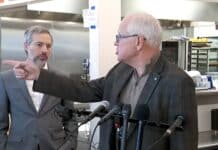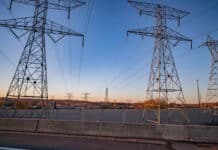With traditional values under siege, it often feels like we’re living in an inside out, upside down world, where right is wrong, and left is right, and those who speak up are shut down.
Friday Food for Thought offers readers news to chew on over the weekend.
The “One Minnesota” Diet
Be it families who live paycheck to paycheck or retirees who rely on Social Security checks, grocery shopping has become more painful than a root canal. Yesterday, the Bureau of Labor Statistics reported that food prices were up 11.2% from September 2021.
If the kids enjoy a bowl of cereal with milk for breakfast, it’s costing you 16 percent more than last year. But it’s not just Fruit Loops that are costing you more. Food prices increased in every category:
- Food-at-home prices: 13%
- Dairy products: 16 %
- Fresh fruit and vegetables: 10.4%
- Cereals and bakery products: 16.2%
- Meat, poultry, fish, and eggs: 9%
- Nonalcoholic beverages: 12.9%
- Other food items: 15.7 %
With prices expected to increase even more, 2023 may well be the year of the “One Minnesota” Diet.
Bundle up and buckle up!
Leaves are falling and so are snowflakes in some parts of the state. But fuel prices are going in the other direction.
- Fuel oil is up 58 percent
- Natural gas is up 33 percent
- Electricity is up 15.5 percent
Planning a getaway? Buckle up. Gasoline is up 18.2 percent and airfare up nearly 43 percent.
Put out the fire!
A fun fact about electric cars — they have a propensity to burst into flames when the batteries are damaged or corroded. Not a typical fire, but one that requires special fire department training, as Florida recently learned. The Florida fire marshal reported “a ton of EVs” were disabled during Hurricane Ian.
Lithium battery fires are tough to extinguish. Even when the flames go out, a phenomenon called thermal runaway can reignite them days after the initial fire. It makes one wonder — did anyone know this before they started pushing EVs?
An EV Minnesota on the horizon
Minnesota is following California’s lead on greening up our vehicles. Last year the Walz administration adopted California’s “Clean Car Standards” without legislative approval, becoming the first midwestern state to do so. The new regulations require auto dealers to stock zero-emission cars and trucks beginning in early 2024.
But they didn’t put on the parking brake. In testimony earlier this month, Walz’s Pollution Control Agency commissioner testified that the Walz administration could adopt even more stringent rules. What’s at the end of the road? A ban on gas-powered vehicles.
Auto dealers stock vehicles based on consumer demand. The California standards force them to adjust the way they do business to conform to government mandates. Not all auto dealers are on board.
Did someone turn out the lights?
Last week, 140 million people in Bangladesh were left powerless in the middle of the day when the country experienced an electric grid failure. California, Texas, and New York have also experienced blackouts when supply and demand were out of wack.
Why should we care? Because America’s electrical grid is aged, undependable, and prone to saboteurs. It’s also self-regulated, which means the government is pushing citizens to use a form of energy it doesn’t control.
Food for thought: As America becomes more dependent on electricity, what happens if the electric grid is sabotaged or overloaded, resulting in large swaths of America unable to access it? How will we get around, cook, cool, or heat? Shouldn’t we fix the delivery system before we head further down this road?
Food, fuel, vehicles … our elected officials have a lot to say about how and when we use power. Consider that as you cast your ballots. Just 25 days until you can use your power.
The views and opinions expressed in this commentary are those of the author and do not represent an official position of Alpha News.











